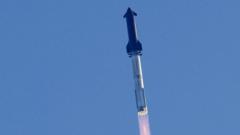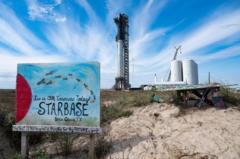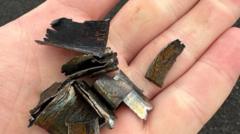Following an explosive failure during its latest test flight, SpaceX's Starship rocket has been grounded by U.S. authorities to conduct an investigation into the catastrophic event.
Grounding of SpaceX's Starship Following Test Flight Explosion

Grounding of SpaceX's Starship Following Test Flight Explosion
The FAA suspends Starship operations as investigations begin into launch anomaly.
The U.S. Federal Aviation Administration (FAA) has initiated a review after the rocket's upper stage disintegrated above the Caribbean, leading to debris scattering and prompting commercial airlines to adjust their flight paths. Launched from Texas, Starship’s upper stage was expected to execute a controlled splashdown in the Indian Ocean but suffered a "rapid unscheduled disassembly."
Reports indicate that no injuries occurred, although the FAA is assessing potential damage to property in the Turks and Caicos Islands. In a collaborative effort, the FAA and SpaceX are engaged in a "mishap" investigation, which is crucial to determining if and when Starship can return to its flight schedule.
The Starship rocket is touted as the most powerful ever constructed, integral to CEO Elon Musk's vision of establishing a human presence on Mars. Thursday's rocket test was a notable attempt as it involved an upgraded version that stands taller than previous iterations.
The mission began successfully, with the upper stage separating from its Super Heavy booster smoothly; however, communication was lost shortly after that. Musk suggested preliminary indications pointed towards an "oxygen/fuel leak" as the cause of the explosion. Despite this setback, he stated that there’s nothing suggesting a delay in the next planned launch, aiming for next month.
Meanwhile, the Starship and the Super Heavy rocket system, which collectively reach a height of approximately 123m (403ft), are designed to be fully reusable. NASA has plans to adapt a modified Starship for lunar missions under the Artemis program.
This incident also coincided with the successful inaugural flight of Blue Origin's New Glenn rocket, intensifying the competitive race between Musk and Amazon's Jeff Bezos in the burgeoning space exploration industry.
Both billionaires aim to reshape the future of space travel, with ongoing developments likely to keep the public and industry watchers on alert.
Reports indicate that no injuries occurred, although the FAA is assessing potential damage to property in the Turks and Caicos Islands. In a collaborative effort, the FAA and SpaceX are engaged in a "mishap" investigation, which is crucial to determining if and when Starship can return to its flight schedule.
The Starship rocket is touted as the most powerful ever constructed, integral to CEO Elon Musk's vision of establishing a human presence on Mars. Thursday's rocket test was a notable attempt as it involved an upgraded version that stands taller than previous iterations.
The mission began successfully, with the upper stage separating from its Super Heavy booster smoothly; however, communication was lost shortly after that. Musk suggested preliminary indications pointed towards an "oxygen/fuel leak" as the cause of the explosion. Despite this setback, he stated that there’s nothing suggesting a delay in the next planned launch, aiming for next month.
Meanwhile, the Starship and the Super Heavy rocket system, which collectively reach a height of approximately 123m (403ft), are designed to be fully reusable. NASA has plans to adapt a modified Starship for lunar missions under the Artemis program.
This incident also coincided with the successful inaugural flight of Blue Origin's New Glenn rocket, intensifying the competitive race between Musk and Amazon's Jeff Bezos in the burgeoning space exploration industry.
Both billionaires aim to reshape the future of space travel, with ongoing developments likely to keep the public and industry watchers on alert.


















